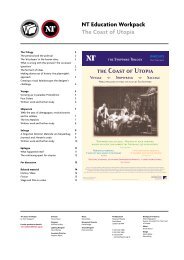Moon on a Rainbow Shawl - National Theatre
Moon on a Rainbow Shawl - National Theatre
Moon on a Rainbow Shawl - National Theatre
You also want an ePaper? Increase the reach of your titles
YUMPU automatically turns print PDFs into web optimized ePapers that Google loves.
The characters<br />
the lengths some of the island’s inhabitants have g<strong>on</strong>e<br />
to in order to survive. She represents those women in a<br />
period of Trinidad’s history who would sell sex to sailors<br />
and soldiers stati<strong>on</strong>ed <strong>on</strong> the island during WW2.<br />
This reality had a deep impact <strong>on</strong> many of the island’s<br />
people and provoked much gossip, jealousy and also<br />
anger in many of the men. A famous calypso at the<br />
time, called ‘Jean and Dinah’, became a worldwide<br />
hit when it was released by the Calyps<strong>on</strong>ian, Mighty<br />
Sparrow. The lyrics centred <strong>on</strong> the huge numbers of<br />
women selling their bodies to the pers<strong>on</strong>nel of the US<br />
bases and <strong>on</strong> how people felt after the bases closed<br />
down at the end of the war:<br />
Jean and Dinah, Rosita and Clem<strong>on</strong>tina<br />
Round de corner posin’<br />
Bet your life is something dey sellin’<br />
But when you catch them broken you could get dem all<br />
for nuttin’<br />
Many prostitutes <strong>on</strong> the island were not <strong>on</strong>ly seduced<br />
by these visitors but were often raped with no thought<br />
for the children that would result.<br />
Mavis knows who she is and what others might think<br />
of what she does. But she also knows that nobody<br />
living in the yard is as saintly or high and mighty as<br />
they might appear. It is this mind-set that lays behind<br />
her verbal explosi<strong>on</strong> at Sophia who advises a visiting<br />
soldier to “see the doctor first thing in the mornin’”: “I<br />
clean, what you know about me? Always washing yer<br />
blasted mouth <strong>on</strong> people!” Mavis may not be as selfrighteous<br />
as Sophia sometimes appears but her words<br />
indicate a self-awareness, that she has feelings like<br />
anybody else in the yard and that n<strong>on</strong>e of the others<br />
are necessarily far away from committing a sin or<br />
making a mistake in need of correcti<strong>on</strong> by others.<br />
The last image of Mavis shows her as a beautiful,<br />
glamorous woman in the mo<strong>on</strong>light being escorted<br />
out <strong>on</strong> a date by a man who cares very much for her.<br />
Her life may not be as perfect as she might wish nor<br />
as moral as others might expect, but she appears<br />
genuinely happy, and there is a possibility that her<br />
future has the potential for positive change. This<br />
last image is not <strong>on</strong>e of a woman entering again the<br />
claustrophobic, ramshackle surroundings of a yard with<br />
a man seeking to pay for sex. It is of a woman leaving<br />
<strong>on</strong> the arm of a man who loves her and cares about her<br />
future. He may not be ‘perfect’ – whatever that means –<br />
but Mavis’ path has more promise than even she allows<br />
herself to acknowledge.<br />
SAILOR/SOLDIER<br />
Although the sailor that Mavis brings back to the yard<br />
at the top of the play <strong>on</strong>ly appears in this scene, his<br />
presence is powerfullycharged<br />
in the c<strong>on</strong>text<br />
of the setting of the<br />
story. He (and the<br />
soldier later in the play)<br />
symbolise the presence<br />
of the American military<br />
<strong>on</strong> the island in World<br />
War 2: not <strong>on</strong>ly as<br />
allies involved in the<br />
fight against Hitler but<br />
also for their impact<br />
<strong>on</strong> Trinidadian society,<br />
a subject which is not often addressed. The famous<br />
Calypso s<strong>on</strong>g ‘Brown Skin Girl’ (by King Radio, 1946)<br />
spoke about this situati<strong>on</strong>, criticising servicemen who<br />
fathered children with local Trinidadian women and left<br />
the babies behind. Mavis first appears in the play just as<br />
Ephraim has told Esther to “go <strong>on</strong>, bring him” (referring<br />
to Esther’s little baby brother). There is no mistaking<br />
why this sailor is in the yard and what his intenti<strong>on</strong>s are.<br />
Creating a baby is not part of his plan but the act he is<br />
about to perform with Mavis could lead to that – and he<br />
would want nothing to do with the baby. As so<strong>on</strong> as he<br />
disappears into Mavis’ room, Esther appears from her<br />
home with a baby in her arms. Placing this acti<strong>on</strong> so<br />
close together is possibly coincidental by Errol John; but<br />
I like to think it wasn’t.<br />
SOPHIA<br />
Sophia first appears looking tired, laden with some<strong>on</strong>e<br />
else’s washing and with much <strong>on</strong> her mind. It is past<br />
midnight and, it may<br />
not be a trolley bus<br />
she has just finished<br />
driving like Ephraim,<br />
but she is still returning<br />
home from work. The<br />
driving that she does<br />
throughout the whole<br />
play is metaphorical<br />
– driving the whole<br />
family, guiding Rosa<br />
as best she can and<br />
eventually doing<br />
everything in her power to try and prevent Ephraim from<br />
aband<strong>on</strong>ing Rosa.<br />
Her usual homecoming ritual is interrupted by seeing<br />
Esther out <strong>on</strong> the veranda with the baby. Sophia’s first<br />
words leave no illusi<strong>on</strong> about her ability to express her<br />
Top: Joshua McCord as Soldier<br />
Above: Martina Laird as Sophia<br />
PHOTOS: JONATHAN KEENAN<br />
Nati<strong>on</strong>al <strong>Theatre</strong> Learning Background Pack 22















